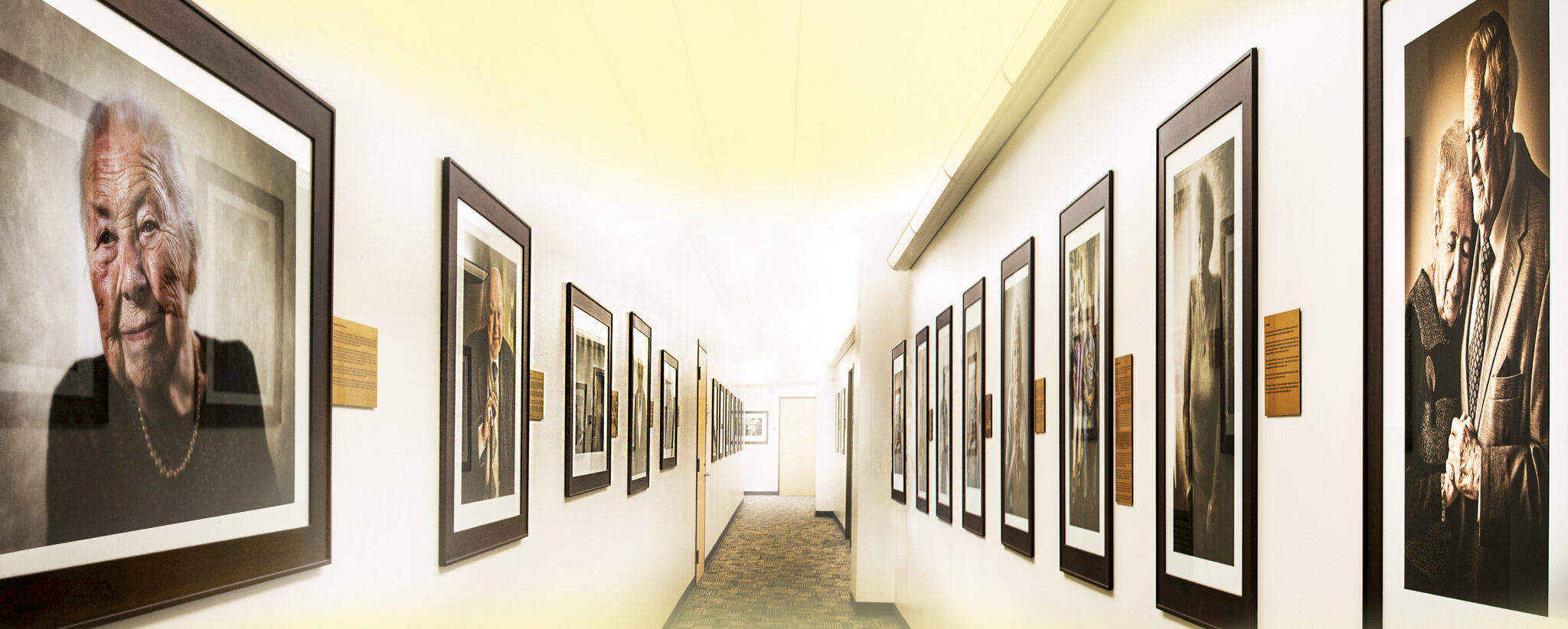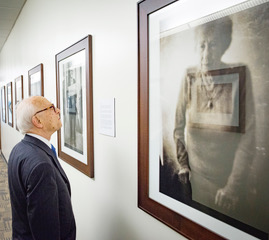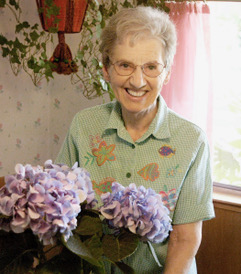Ursula Lowenbach Foster Holocaust Survivor Portrait Gallery


“First they came for the Socialists, and I did not speak out—
Because I was not a Socialist.
Then they came for the Trade Unionists, and I did not speak out—
Because I was not a Trade Unionist.
Then they came for the Jews, and I did not speak out—
Because I was not a Jew.
Then they came for me—and there was no one left to speak for me.”
—Pastor Martin Niemöller

Holocaust Survivor Dr. Jacob Eisenbach visits the gallery containing his portrait as well as those of over 50 others. Here he views the image of Eva Schloss, whose mother married the father of Anne Frank after the war.
In 1945, after Hitler decimated the robust Jewish population of Europe with the horrors of the concentration camps and gas chambers, a precious few Jews – only one in three survived – would find themselves deemed “survivors.” With families murdered and life as they once knew it now a faded memory, many Jews assimilated into the world at large with a determination to continue living, one day at a time, in search of meaning and hope.
The desire to honor the memory of loved ones lost motivated the Jewish population to slowly move forward and make the days that lay ahead filled with purpose. Some would find solace in celebrating the rich Jewish traditions and honoring the holidays, while others dedicated their lives to giving back and making a commitment to carve something out of the ruins their lives had been brought to.
This incredible group, the survivors of the Holocaust, has left a legacy for the generations that follow – a legacy of resilience, love, caring for others, and living a life of purpose. Their determination to survive was transformed into a commitment to speak out about the horrors of the past in order to ensure that in the future, we accept all people, no matter their color, race, creed or religious belief.
At Cypress College, we celebrate our diversity. As we remember the struggles and challenges of the past, we should look forward with hope and confidence that tomorrow will bring change, acceptance and a commitment that we all have a voice.
“No human being should ever be treated the way we were treated.”
Ursula Lowenbach Foster, Survivor of the Holocaust

Dedication
Ursula Lowenbach Foster Holocaust Survivor Portrait Gallery Dedication April 20, 2022
Ursula Lowenbach Foster impacted the lives of the many students she shared her story with, and her journey to make a difference continues today in a legacy that will live on forever. In our mother’s honor, my brother Rick and I dedicate the Ursula Lowenbach Foster Holocaust Survivor Portrait Gallery, containing over 55 portraits of survivors I have had the immense honor to interview and photograph. Motivated by my mother, I created these images of Holocaust survivors, in order to ensure their stories, as well as my mother’s, would continue inspiring students to learn more about discrimination and adversity, so that through the voices of our children, the world will never forget.
Ursula Lowenbach Foster, a Holocaust survivor and former classmate of Anne Frank, fled Germany and moved to Amsterdam in 1938 when she was 11, to escape Nazi persecution. Two years later, Germany conquered the Netherlands and brought the same persecution to Ursula’s new home. In 1942, that persecution took a dramatic turn for the worse when Ursula’s older brother, Ernst, at age 18, was sent by the Nazis to Auschwitz Concentration Camp in Poland, where he was murdered in the gas chambers.
In order to avoid a similar fate, Ursula and her parents went into hiding in 1943. For nearly two years, they lived secretly in an overcrowded house with 12 other Jews, all hidden by a merciful Dutch family. For one of those years, all 15 of the guests were forced to sleep in the dirt underneath the house — among the crawling insects and rats — in order to escape detection by the Nazis. It was a devastating, humiliating manner of existence, the horrors of which few of us could ever truly grasp. And though it would have been much easier to let the memories of those days fade forever, Ursula spent many years before her passing courageously doing just the opposite.
As a way to honor her brother, Ernst, and for the betterment of the world, Ursula did her best to keep the memory of the Holocaust alive, so that such a terrible thing would not happen again. Although very shy, she gave her time and shared her experiences with many school children at schools in Modesto, CA, giving talks about the Holocaust and its horrific impact on her life and those of her family and friends. She wanted children to know how precious freedom is, and that we can’t take it for granted. We must learn from the past, she said, about “what can happen if prejudice and hatred are allowed to run wild.”
זיכרונה לברכה
May Her Memory be a Blessing.
Clifford Lester, Professor Emeritus, Cypress College
Gallery Expansion on the Fourth Floor of the Cypress College Complex

These images reveal the human spirit and the determination for survival. As we look into their eyes, it is my wish that they emerge “victorious” over the evil that befell their loved ones. We will ensure that their spirit will forever live on if we maintain respect for our fellow man.
— Clifford Lester, Professor Emeritus, Cypress College
Celebrating Life Through Photography
Clifford Lester is a retired professor of photography at Cypress College and a student of the Jewish experience. Inspired by his mother, Ursula Lowenbach Foster, a Holocaust survivor, Clifford has followed in her footsteps of embracing life. To honor her brother, Ernst, who was killed in Auschwitz, Ursula showed everyone around her that life was something to be grateful for, something to celebrate.
Today, twenty years after her passing, Clifford finds himself much closer to his Jewish roots, and much more appreciative of his life. Grateful for his family, his friends, and the opportunity to share photographic adventures with students, it is through the artistic avenues of the photographic lens that Clifford shares his perspective on life. Even in his teen years, Clifford began to notice the beauty in things through the viewfinder of his camera that other people would just walk by. He knew he had to bring this beauty and light into the lives of others.
At the present time, after a career of 27 years as a studio advertising photographer, and 18 years of teaching at Cypress College, Clifford is enjoying his retirement by committing to perhaps his most meaningful project, remembering Holocaust Survivors.
Clifford says that the goal of these images is to “capture the Faith and courage of those who survived, and to honor the memory of those loved ones lost, so the memory and lessons of the Holocaust will never be forgotten.”
This incredible group, the survivors of the Holocaust, have left a legacy for the generations that follow–a legacy of loving, caring for others, and giving purpose to their lives. Many are people of Faith, guided by an intense love of Torah and G-d, all are moved to celebrate their given days.
We pray that through these images and the lives they have lived, their spirit will forever carry on and Bless those who follow.
Gallery Location and Hours
The Holocaust Survivors Photo Gallery is located in the Student Center in the hallway on the second floor. Hours mirror those of Admissions and Records. The second location is on the fourth floor of the Cypress College Complex. Hours there are 8 a.m.–5 p.m. Be sure to visit both locations.
Guided Docent-Led Tours
While visitors are free to explore the Holocaust Survivors Portrait Gallery independently, those seeking a more in-depth experience are encouraged to join docent-led tours. These tours delve into the personal stories of the survivors featured in the gallery, highlighting how they endured in impossible circumstances, as well as their profound examples of resilience, courage, hope, and gratitude.
In addition to these personal stories, docents discuss the historical context of the Holocaust, explaining the circumstances under which such appalling atrocities could occur.
Probably the most significant takeaway for visitors is embedded in the narrative crafted by the docents. Visits are designed to be more than just informative tours; they aim to instill the importance—and the responsibility—of standing up against bigotry and hate.
For more information, or to schedule a docent-led tour, please contact:
E: clester@cypresscollege.edu
T: (714) 469-6764
